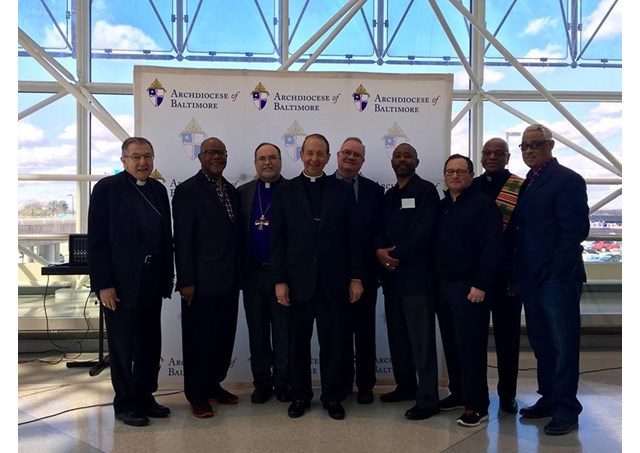
Archbishop Lori leads interfaith pilgrimage to Rome

(Vatican Radio) Archbishop William E. Lori of Baltimore led an ecumenical and inter-religious group of leaders from his city on pilgrimage to Rome this week. The city of Baltimore is still reeling from the shock of civic unrest in the wake of the highly publicized death of a young black citizen named Freddie Gray last spring, after Gray had been taken into police custody. Leaders from Catholic, Jewish, Muslim, and several Protestant churches and communities decided to make a visit to Rome together in order to strengthen the bonds of friendship that already unite them, and obtain the blessing of Pope Francis on their commitment to work together to address key areas of importance in the city.
Imam Earl El-Amin of the Muslim Community Cultural Center of Baltimore, Rabbi Steven Fink of Temple Oheb Shalom, the Rev. Dr. Al Hathaway of Union Baptist Church, the Rev. Wolfgang D. Herz-Lane of the Evangelical Lutheran Church in America, Auxiliary Bishop Denis Madden of the Archdiocese of Baltimore, Mr. William McCarthy of Catholic Charities, the Rev. Dr. Frank Reid of Bethel AME Church, and the Rev. Donald Sterling of New All Saints Catholic Church, have been in dialogue with one another over the past year, discussing issues that came to the forefront of the local and national consciousness in the aftermath of the death of Freddie Gray.
Click below to hear the extended conversation between Vatican Radio's Chris Altieri and pilgrimage members Imam Earl El-Amin, Rabbi Steven Fink, Lutheran Bishop Wolfgang D. Herz-Lane, and Archbishop William Lori
Part 1
Part 2
“There’s a lot going on in the wake of what has happened,” said Imam Earl El-Amin to Vatican Radio. “A lot of good and positive things have taken place,” he continued. “You see relationships: as you see with us, with what we are doing – which started many years ago,” he said. “We’ve been involved in other initiatives and activities that have benefited the quality of life in the city of Baltimore, but this – we’ve come together because we’ve seen, over time, that there has to be some input from the faith community in building relationships – not just for the faith communities, but for the citizenry of Baltimore.”
Imam El-Amin’s sentiments were echoed by Rabbi Steven Fink, who said, “Our religious life is based upon common values, and it would be irresponsible of us not to bring those values into the public domain,” especially at a time in which there is a broad national conversation and re-thinking of the role of religion in public life. He went on to say, “Once you do that, you inevitably get involved in working on political causes.”
Asked what he would say in response to those, who express the view that religious leaders and believers ought to stay out of politics, Archbishop Lori said, “Politics can mean a lot of things: it can mean partisan politics,” and short-sighted pursuit of narrow interest. “Really,” Archbishop Lori added, “what ‘politics’ means is looking at the body politic and the common good: and our faith communities exist to serve the common good.” Archbishop Lori, who is the Chairman of the US Catholic Bishops’ ad hoc Committee on Religious Liberty, went on to explain, “To say, ‘stay out of politics!’ means to say, ‘disengage from the culture, stay within your four walls,’ and that is not who we are.”
“Building bridges, rather than walls,” is how ELCA Delaware-Maryland Synod Bishop Wolfgang D. Herz-Lane described their common task. “[It] is really a profoundly counter-cultural thing,” he continued. “You know, if Jesus hadn’t done political things, He wouldn’t have been crucified,” he said, “and so our very heritage, from that perspective, is to be very much involved: not in partisan politics – you know – ‘which candidate is the best?’, but in calling people to their best behavior and to their best instincts.”
| All the contents on this site are copyrighted ©. |


